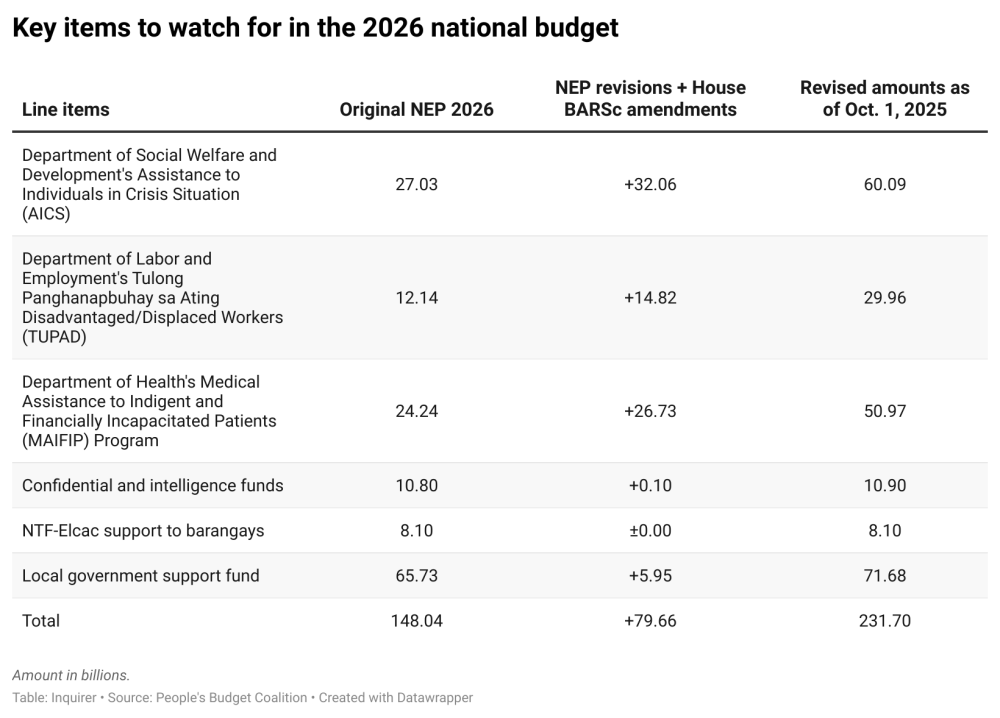P230-B ‘pork’ in House version of 2026 budget

The House version of the 2026 national budget contains at least P230 billion in pork barrel and patronage-based projects despite the House committee on appropriations’ promises to avoid a repeat of the much maligned 2025 General Appropriations Act (GAA).
This was according to a coalition of civil society organizations and budget watchdogs, which called on Congress to reallocate the entire amount instead to social protection, health, agriculture and sustainable transportation programs.
“We refuse to let the GAA remain a playground for patronage and corruption. We call on Congress to hit reset on the budget, clean it up, and restore integrity to our budget process to truly respond to the needs of the nation,” they said in an open letter published on Tuesday.
Among the signatories were People’s Budget Coalition, PH Budget Watch, Roundtable for Inclusive Development, Move as One Coalition, FOI Youth Initiative, Project Gunita, Caloocan Bishop Pablo Virgilio David and former Sen. Franklin Drilon.
Observer status
Most of these groups were granted observer status by the House for the 2026 budget process as part of the chamber’s reforms to make the proceedings more transparent.
In their letter, however, they said they had “lost trust in the integrity of the budget process” after the House budget amendments review subcommittee (BARSc) voted to insert billions into programs that they said “perpetuate political patronage.”
This, they said, comes with the House’s failure to “remove or rationalize line items that are opaque and prone to abuse” such as confidential funds and unprogrammed appropriations.
Unprogrammed funds
The BARSc was constituted for the first time in the history of Congress under House appropriations chair and Nueva Ecija Rep. Mikaela Suansing.
Before the House staged its marathon plenary deliberations on Sept. 23, the subcommittee moved to realign the P255 billion slashed from the Department of Public Works and Highways to, among others, the Department of Social Welfare and Development’s Assistance to Individuals in Crisis Situation, the Department of Health’s Medical Assistance to Indigent and Financially Incapacitated Patients Program, and the Department of Labor and Employment’s Tulong Panghanapbuhay sa Ating Disadvantaged/Displaced Workers program.
These programs, along with the controversial Ayuda para sa Kapos ang Kita program that was defunded this year, have long been criticized for being a form of congressional pork barrel.
4Ps, education
The budget watchdogs argued that these programs must either be transformed into “transparent, rules-based programs—or scrap[ped] altogether.”
The funds, they added, must be reallocated instead toward the Pantawid Pamilyang Pilipino Program (4Ps) and the full restoration of the government subsidies due to the Philippine Health Insurance Corp.
Specifically, they said, Congress must at least allocate the P50 billion they cut last year for qualified 4Ps beneficiaries.
The groups also corrected the House’s claims that the education budget—now at P1.224 trillion—already breached the benchmark of 4 percent of the gross domestic product (GDP), as the current allocation was equivalent to only 3.6 percent.
They also noted that the education sector saw an increase of only P35 billion even though the Department of Education and related agencies asked for a total of P100 billion to cover, among others, shortages in classrooms, computers, and the provisions in the free college education law.
Beyond the P230 billion that they tagged as pork barrel, the groups also flagged the “bloated level” of P250 billion in unprogrammed appropriations (UAs) in the National Expenditure Program (NEP).
UAs are standby authorizations that can be tapped only when new revenue or loans materialize.
These, they said, must be “slashed and heavily rationalized to ensure these are not used for local pork projects or be used as a pretext to sweep cash from government corporations with existing fiduciary mandates.”
Source of abuse
On the part of the House minority, Mamamayang Liberal Rep. Leila de Lima and Akbayan Rep. Perci Cendaña said they support Senate President Vicente Sotto III’s proposal to slash the UA completely from the 2026 national budget.
“We’ve seen in 2023, 2024 and even 2025 that the UA has been a source of abuse,” De Lima said, referring to testimonies that lawmakers have been inserting funding for public works projects in the NEP through the UA.
“[The Senate position] is also our position and of the minority lawmakers… we’re hoping that, if we can’t remove it completely, then at least be very restrictive about it and limit it only to a few items and agencies,” she added.
Cendaña, on the other hand, challenged the House leadership to also make the same commitment, emphasizing that if the projects under the unprogrammed funds were indeed important, “then they shouldn’t be unprogrammed in the first place.”
“If the unprogrammed appropriations stay, then it might cast a shadow on our efforts to cleanse the stain of corruption from our national budget. We hope that Speaker Faustino Dy III will ensure its removal to show the House is committed to rebuilding public trust,” he said.

















